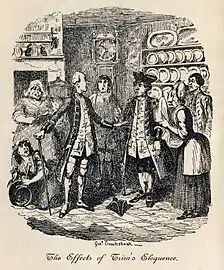Eloquence
Eloquence (from French eloquence from Latin eloquentia) is fluent, forcible, elegant or persuasive speaking. It is primarily the power of expressing strong emotions in striking and appropriate language, thereby producing conviction or persuasion. The term is also used for writing in a fluent style.

The concept of eloquence dates to the ancient Greeks, Calliope (one of the nine daughters of Zeus and Mnemosyne) being the Muse of epic poetry and eloquence. The Greek god Hermes was patron of eloquence. Cicero is considered as one of the most eloquent orators of Antiquity. Fr. Louis Bourdaloue is regarded as one of the founders of French eloquence.

Eloquence derives from the Latin roots: ē (a shortened form of the preposition ex), meaning "out (of)", and loqui, a deponent verb meaning "to speak". Thus, being eloquent is having the ability to project words fluidly out of the mouth and the ability to understand and command the language in such a way that one employs a graceful style coupled with the power of persuasion, or just being extremely graceful in the interpretation of communication.
Petrarch (Fracesco Petrarca), in his study program of the classics and antiquity (Italian Renaissance) focused attention on language and communication. After mastering language, the goal was to reach a "level of eloquence", to be able to present gracefully, combine thought and reason in a powerful way, so as to persuade others to a point of view. Petrarch encouraged students to imitate the ancient writers, from a language perspective, combining clear and correct speech with moral thought. The Renaissance humanists focused on the correlation of speech and political principles as a powerful tool to present and persuade others to particular concepts. At the core of presentations was the use of graceful style, clear concise grammar and usage, and over time the insertion of rational and emotional arguments.
In modern times, colloquial speech entered into presentation styles deemed eloquent.
Eloquence is both a natural talent and improved by knowledge of language, study of a specific subject to be addressed, philosophy, rationale and ability to form a persuasive set of tenets within a presentation.
"True eloquence," Oliver Goldsmith says, "Does not consist ... in saying great things in a sublime style, but in a simple style; for there is, properly speaking, no such thing as a sublime style, the sublimity lies only in the things; and when they are not so, the language may be turgid, affected, metaphorical, but not affecting."[1]
Eloquent politicians
The Roman politician and soldier Marcus Antonius, c. 83–30 BCE, gave one of the most memorable speeches in history, dramatized by William Shakespeare in the play Julius Caesar; Shakespeare used Antonius's famous opening line "Friends, Romans, countrymen, lend me your ears".
Many famous political leaders, like Winston Churchill and Martin Luther King Jr., dictators such as Adolf Hitler and Benito Mussolini, rose to prominence in large part due to their eloquence. In the Iranian Revolution, Ruhollah Khomeini came to power in part through the eloquence of his speeches, smuggled into the country on audio cassettes while he was still in exile.[2]
See also
- De vulgari eloquentia an essay by Dante Alighieri
- Peak of Eloquence (Nahj al-Balagha)
- Public speaking for oratory and oration
- Rhetoric
- Conférence du barreau de Paris
References
- Goldsmith, Oliver (1759). Of Eloquence.
- Stephen Zunes (April 2009). "The Iranian Revolution (1977-1979)". ICNC.
Further reading
- Mark Forsyth (2013), The Elements of Eloquence: How to Turn the Perfect English Phrase.
External links
| Wikiquote has quotations related to: Eloquence |